Here is a wonderful resource for celebrating the Holy Week and Pascha at home. The resource is curated by the nuns of Christ the Bridegroom Monastery (Ohio). It is the best thing found so far and perhaps it can aid you in this time!
Category: Adult Faith Formation
Spiritual Resources for this time
Talking serious theology
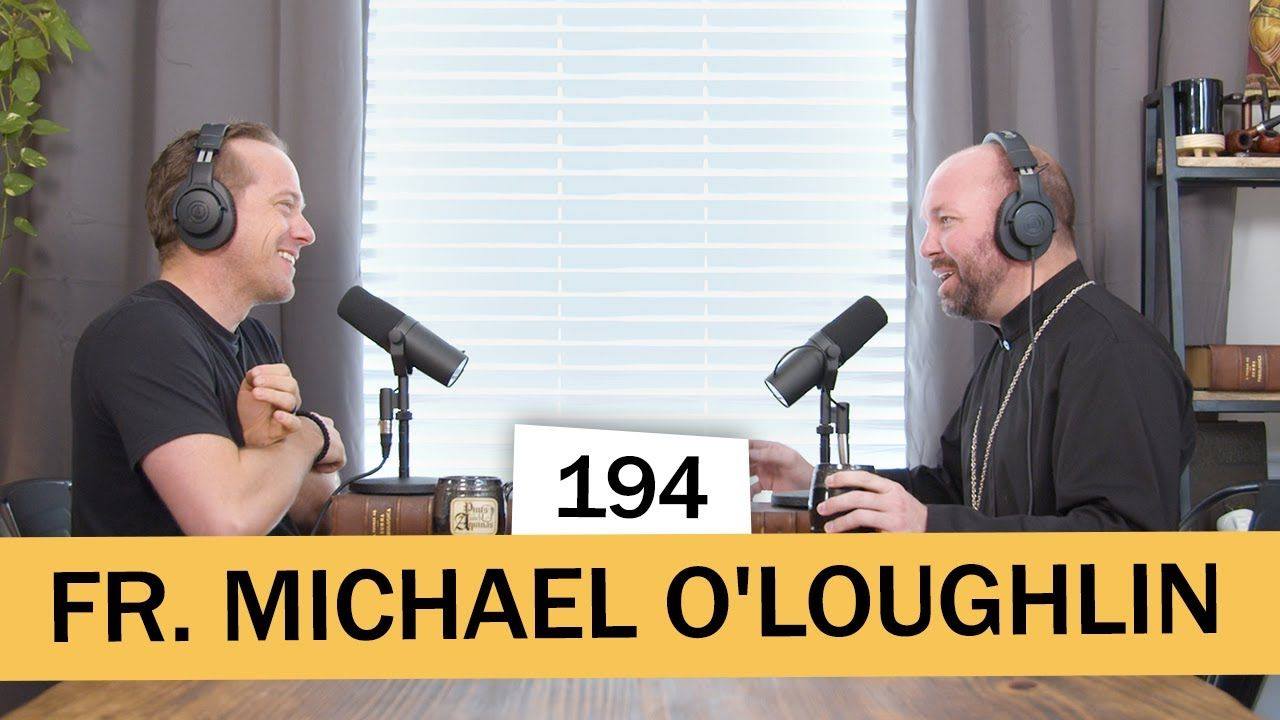 New Episode from Matt Fradd! I talk with Byzantine priest and co-host of Catholic Stuff You Should Know, Fr. Michael O’Loughlin about the Eastern Catholicism, Eastern Orthodoxy, the Filioque, and much, much more.
New Episode from Matt Fradd! I talk with Byzantine priest and co-host of Catholic Stuff You Should Know, Fr. Michael O’Loughlin about the Eastern Catholicism, Eastern Orthodoxy, the Filioque, and much, much more.
Listen here: https://buff.ly/2Vn5WHF
Does God really change you?
Often we can take the designation ‘child of God’ as a metaphor, as a nice thought, but not something that reaches down to our very core. Yet the communion that Jesus invites us into is no metaphor, but a reality that changes our inner landscape. In Jesus, we become part of his risen body, sharing his inheritance as sons and daughters of God. (NS)
The Sunday Before Christmas: The Genealogy of Jesus
![]() The Gospel this Sunday presents us with an abundance of names, all those who were the ancestors of Christ. By this we see that on this feast, the Son and Word of God becomes a part of the human family and a part of human history. In this Gospel Jesus is also given a name, the final verse tells us that the child will be known as Jesus – Savior. In verse 22, though, he is given the name “Immanuel,” “God with us.” This gives us the theological meaning of the feast, the incarnation signifies our deification.
The Gospel this Sunday presents us with an abundance of names, all those who were the ancestors of Christ. By this we see that on this feast, the Son and Word of God becomes a part of the human family and a part of human history. In this Gospel Jesus is also given a name, the final verse tells us that the child will be known as Jesus – Savior. In verse 22, though, he is given the name “Immanuel,” “God with us.” This gives us the theological meaning of the feast, the incarnation signifies our deification.
We all have names, but for the ancients, names had meanings, they did not simply give us an identification tag, but told us something of who we were. In that sense, we do not name ourselves, but we are given a name, we are all “called by name” by God, and so we enter into the ancestry of Jesus. The names are the forefathers of Jesus, but also the foremothers are mentioned: Tamar, who bore a son by trickery of Judah; Ruth, the grandmother of David, who left her people to follow Naomi; the unnamed wife of David, Bathsheba, who David married by arranging for the death of Uriah. We see, then, that even trough questionable and evil actions, as well as by faithfulness, Jesus becomes “the son given to us.” The greatest of the woman in his genealogy is, of course, Mary, his mother, who by her obedience cancelled the curse of Eve, and united God with humanity in her womb.
Today, we celebrate the Son of Abraham, according to the Law, and the Son of David, the everlasting King, to whom even David bowed, and even the Son of exile, for we are all citizens of the spiritual, not the earthly, Jerusalem. Today we must be named as a follower of Christ.
Meditation by Archpriest David Petras
#ByzantineCatholicNewHaven
#ByzantineCatholicCT
#ByzantineCT
The Maternity of the Holy Anna
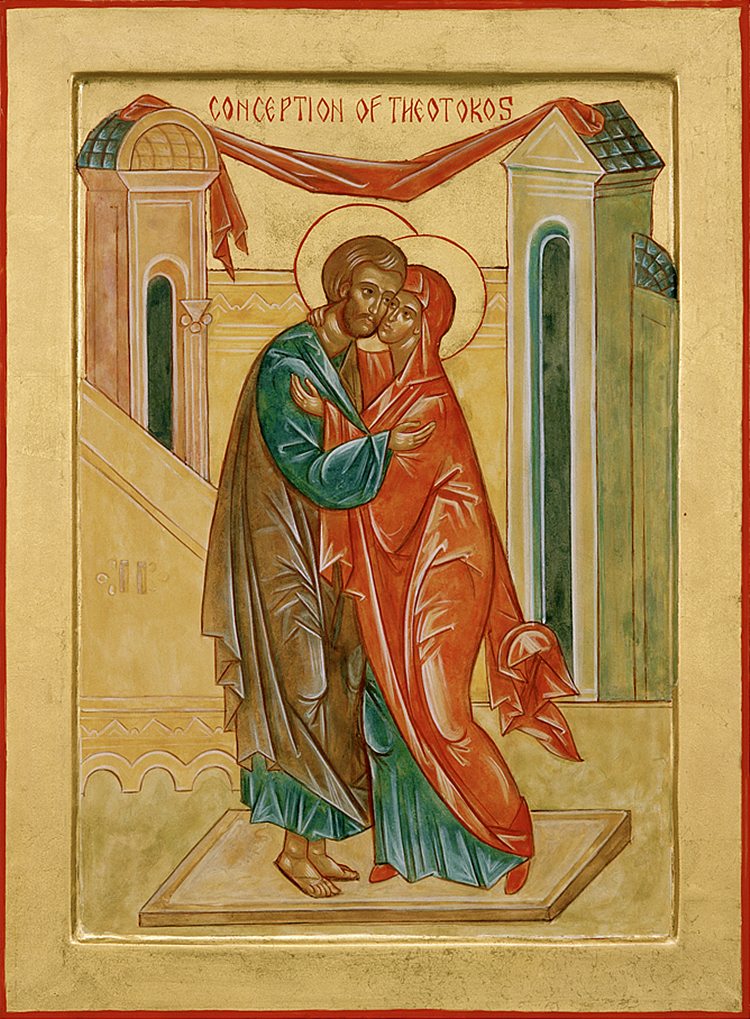 December 8 (December 9) THE MATERNITY OF THE HOLY ANNA
December 8 (December 9) THE MATERNITY OF THE HOLY ANNA
The conception of the all-holy virgin Mary in the womb of Anna is celebrated on December 9 in the Byzantine tradition, for a natural reason, that the Eastern ancients thought a girl was in the womb one day less than a boy. The [Ukrainian Catholic Church in America celebrates the feast on December 8] Ruthenian Church in America, celebrates the feast together with the Roman Church because she is the patron of the United States.
It is clear that this is a preparation for the birth of Christ on Christmas, for the first sticheron of the feast begins: “The barren Anna leaped for joy when she gave birth to Mary the Virgin who in turn will give birth in the flesh to God the Word.” Mary, the daughter of Anna and Joachim by way of natural birth is to be the temple of the Word of God incarnate for our sake and for our salvation.
The Eastern and Western Churches put the accent on different aspects of the feast. In the East, we celebrate the miracle of God taking away the barrenness of Anna’s womb. The Protoevangelium of James portrays the sadness of Joachim and Anna. Joachim lamented, “I have searched whether I am the only one who has not begotten offspring in Israel, and I have found of all the righteous that they had raised up offspring in Israel.” Anna wept, “I will bewail my widowhood, and bewail my childlessness.” (1,3 and 2,1) Two angels came, one to Joachim and another to Anna with a divine message that they would bear a child, even in their old age. When God takes away an emptiness, he fills us more than our faith can grasp, and they gave birth not only a child, but to the new Ark of God’s covenant with us.
The Western Church, on the other hand, puts the accent on Mary’s purity from all sin from her conception, defined by Pope Bl. Pius IX in 1848 as the Immaculate Conception. The theology behind this is that the incarnation of the sinless Word of God must come from a sinless temple, the womb of Mary which was never touched by sin, even from her conception.
Twenty-Fourth Sunday after Pentecost 2019
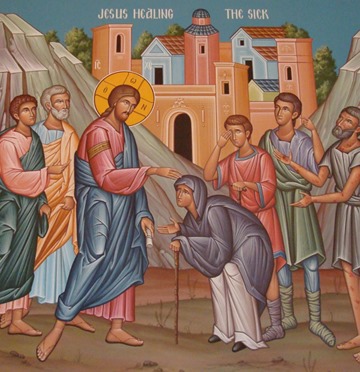 Read: Ephesians 2:14-22
Read: Ephesians 2:14-22
Luke 13:10-17
This Sunday, Jesus heals a woman bent over so she could not walk straight. “And a woman was there who for eighteen years had been crippled by a spirit; she was bent over, completely incapable of standing erect. When Jesus saw her, he called to her and said, “Woman, you are set free of your infirmity. (Luke 13:11-12)” Being bent over, the woman could see only the dirt before her, she could not lift up her eyes and see the trees, the towns, the horizon or the sky. She was not guilty of her infirmity, and Jesus had mercy.
Again, however, the Pharisees could not see the true moral horizon, putting the Sabbath law above the woman’s health, and so Jesus brands them, “Hypocrites. (Luke 13:15)” We all are that woman, but is it because of illness or our own will? We are short-sighted, we see only the dirt in front of us, and we do not see the horizon. We see only what we want to see, and hear only what we want to hear. We need the gift of wisdom to see the horizon, to see what is true.
See what the first thing the woman does when she is healed – she glorifies God. That is the greatest glory we have as human beings, we are able to see the vast expanse of the universe, something no other creature on earth can do, and we are able to give glory to God who created it all! Fr. Robert Taft gave an interview in November of 2009 in which he responded to the question: What do we get out of the Liturgy? His response was, “What you get out of the liturgy is the privilege of glorifying almighty God.” God, “who made both one and broke down the dividing wall of enmity (Ephesians 2:14),” lifts up our eyes today, glory to God!
Meditation by Archpriest David Petras
#ByzantineCatholicNewHaven
Twentieth Sunday after Pentecost
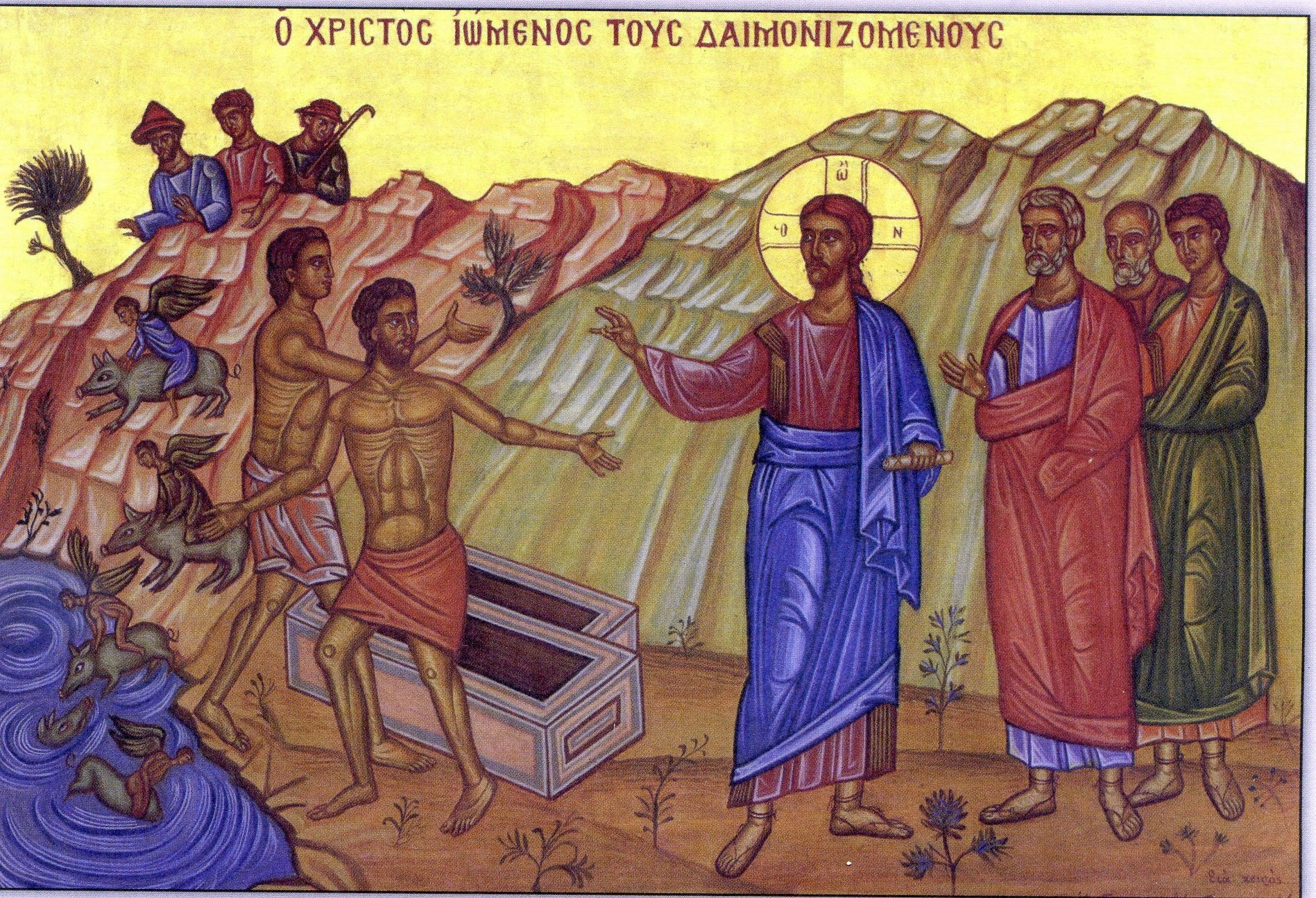 Read: Luke 8:26-39
Read: Luke 8:26-39
The idea this gospel is addressing is fear. Jesus comes to the land of the Gerasenes and casts out a legion of demons from a possessed man. The gospel of Luke is succinct on this point and only notes that he lived among the tombs (that is, among the dead).
In the gospel of Matthew, we read the detail that “they were so savage that no one could travel by that road” (Matthew 8:28). Jesus’ cure is like a resurrection to life, making him free from the tombs. The demons are sent into unclean animals, the pigs, and this evil is promptly destroyed. The townspeople come out to see what had happened, and rather than welcoming Jesus as a healer and the conqueror of evil, the gospel says “they were seized with fear,” and St. Luke repeats, they “asked Jesus to leave them because they were seized with great fear” (Luke 8:35.37).
Of what were they afraid, that their commodity (the pigs) had been destroyed, or that the demoniac man was still possessed by demons? We often “demonize” and “dehumanize” what we fear. We, too, are God-fearing, when we approach Holy Communion the deacon warns, “Approach with the fear of God and with faith.” The townspeople were afraid and asked Jesus to leave, but a true “fear of God,” which is expressed in faith and love, draws us nearer to God in Communion.
The Lord can free us from evil, so approach and receive him who told us, “Take courage, for I have conquered the world” (John 16:33).
Meditation by Archpriest David Petras
#ByzantineCatholicNewHaven
Seventeenth Sunday after Pentecost
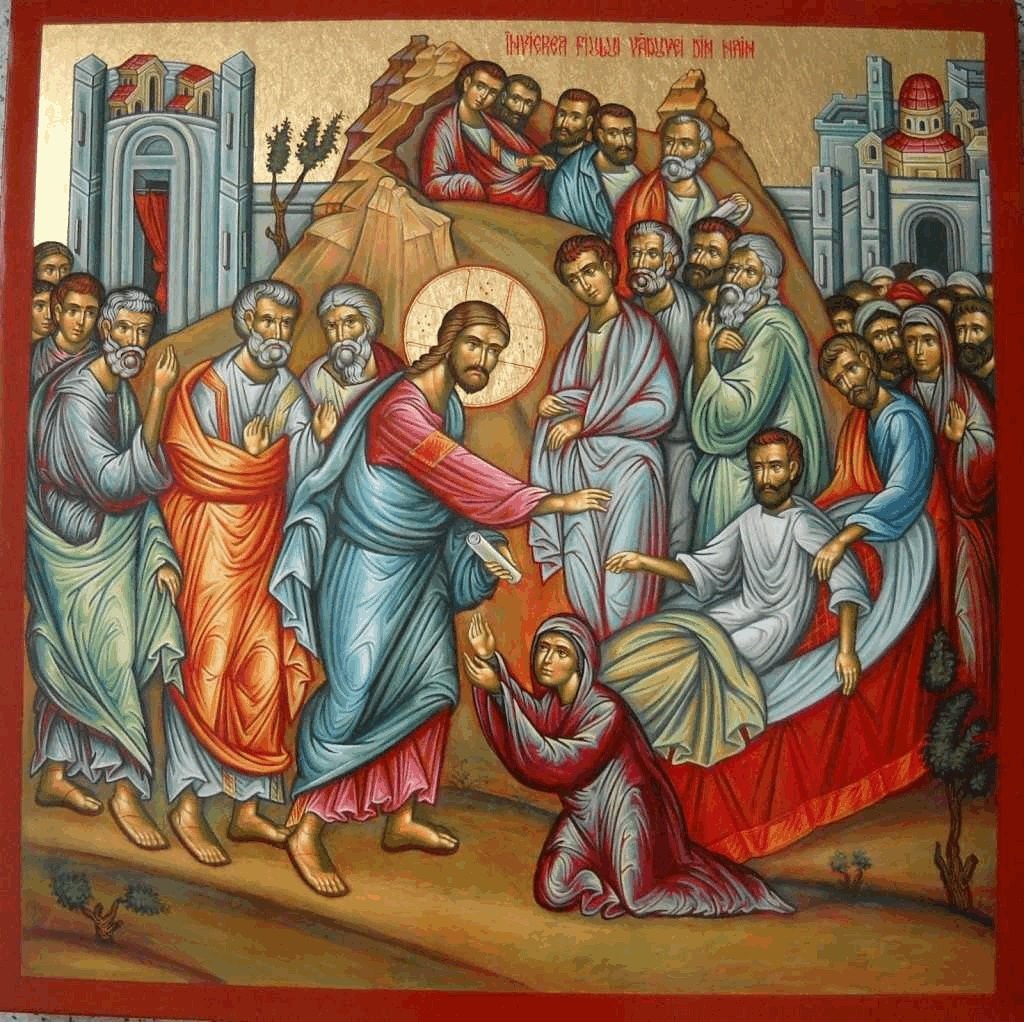 Seventeenth Sunday after Pentecost, 2019
Seventeenth Sunday after Pentecost, 2019
Our Lord is the Life-giver. The gospels record Jesus’ presence at baptisms and weddings, but never at a funeral, for death cannot remain in the presence of the Giver of Life.
Today Jesus comes upon a funeral in the village of Nain, it seems almost accidently and by chance, though nothing ever happens totally by chance. Jesus stops the funeral and raises up the young man, the only son of a grieving widow. The Gospel continues the theme of last Sunday, “Be merciful, as your heavenly Father is merciful, for today Jesus raises the young man, “When the Lord saw (the widow), he was moved with pity for her and said to her, ‘Do not weep.’ He stepped forward and touched the coffin; at this the bearers halted, and he said, ‘Young man, I tell you, arise!’ (Luke 7:13-14)” Here Jesus has compassion on the love of a mother for her child.
Today is a prayer for a mother’s love, especially for mothers pregnant with unborn children, that they may bring them to life. Today shows us also the God’s giving of life is not only for the future world but begins here and now. As we receive Communion, the priest says, “The servant of God receives the precious Body and Blood of our Lord Jesus Christ for the remission of sins and life everlasting.” We are in the presence of the Lord, therefore in the presence of life. Jesus teaches, “I came so that they might have life and have it more abundantly. (John 10:10)
Meditation by Archpriest David Petras
#ByzantineCatholicNewHaven
The Sign of the Cross
Every time we sign ourselves with the holy Cross, saying “In the name of the Father, and of the Son, and of the Holy Spirit,” we profess that our salvation, accomplished on the cross by Jesus Christ, is the work of the Holy Trinity.
Christ Our Pascha, 626
(Catechism of the Ukrainian Catholic Church)